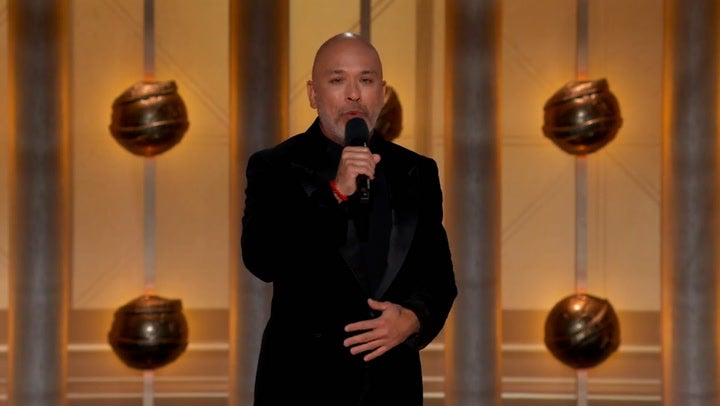Jo Koy bombing at the Golden Globes? Meh, I’ve had worse...
You can be the best writer in the world and have the best comedy wordsmiths in the business helping you, but if you can’t sell it on stage, then you might as well be up there reading the phone book, writes Vix Leyton


A lot of people wouldn’t have known the name Jo Koy before last night; an American comic who has been doing stand-up for 30 years before taking on the prestigious job of Golden Globes’ host. When he accepted the job, he was probably hoping to be a viral sensation by this time – get it right and the world will know your name. However, get it wrong and the world will also know your name…
The question you get asked most when you tell someone you do stand-up comedy is what it feels like to “die” on stage. You tell people it is par for the course, it’s a rite of passage, and that you build up resilience over time. The first two are absolutely true – as a new comic you’ll likely be comforted after a death with “Millican’s Law”. Devised by Sarah Millican to stop her dwelling on a bad gig, she’d allow herself to wallow in it until 11am the next day, then draw a line. The third point, about resilience, not so much.
Stand-up comedy, however curated, involves you putting yourself centre stage, asking people to like you – and when they don’t, it hurts. As Koy has demonstrated, you are never too big or too experienced to face a death on stage, the only difference is, as you advance, the stakes get so much higher.
Hosting the Golden Globes is a balancing act: while the audience don’t have to find you hilarious straight off the bat, they do have to like and trust you – you’re their guide through the event and your job is to bring people together.
Ironically, doing a bad job can bring people together as much as a good job – what’s more bonding than catching the eye of a stranger – as another of the comedian’s jokes clangs into a harrowingly silent room – and grimacing together? And the star attendees have never seemed more human than they did last night, with responses ranging from the rictus grin to Taylor Swift’s scowl that became a meme immediately.
So, what went wrong? One of the big problems is Koy revealed he was struggling. Audiences can smell blood, as soon as it looks like you don’t know what you’re doing, they start to feel uncomfortable. This is most people’s actual nightmare, and the empathy and second-hand horror means the audience can’t relax or enjoy it.
The worst death I’ve had – and if you remember a worse one, please remember sometimes your brain protects you from the biggest horrors – was at one of my final shows before my first Edinburgh Fringe.
I had been running the show for months and things had been going well. There was no reason to feel this night would go any different. It was a busy room, and I was in the support slot for Justin Moorhouse. When the MC introduced the night, it was clear that the audience were not expecting – or wanting – another full show before Justin’s full show. Plus, it was the hottest day of 2021, in a basement with one Argos fan providing the aircon – I didn’t blame them. But unfortunately, that meant they were exasperated with me before I had even put a toe on the stage.
I opened with what I considered bulletproof material from my club set that I had done about 1000 times. It landed badly. I limped through the next few minutes, but my tone was off, I was clamoring to get them back. Over time, more and more audience members muted their laughter.
I will remember the faces of the handful of audience members who, I suspect mostly out of pity, stayed with me loyally, laughing as loud as they could to try to fill the room. They were like lighthouses on a rough sea, their faces willing me to land a good one. These types of audience members are the reason some comedians go on after a death. They are the MVPs of comedy. If you were in that room and are reading this now, thank you.
After 25 minutes of existential horror that peaked with me accidentally starting the same joke again, I decided to bring the show to a close early. So I used the last play left in the book – I revealed to them I knew it hadn’t gone well by, ironically, going into my final bit about what was, at least when I wrote it, the “worst death I’ve ever experienced on stage”.
You can be the best writer in the world and, like Koy, have some of the best comedy wordsmiths in the business helping you, but if you can’t sell it on stage, then you might as well be up there reading the phone book.
Koy blaming the writing so openly, and so early on, was likely one of the reasons it went as badly as it did. Whilst being meta is on trend, people don’t want that in their comedy.
Comedy is like watching magic – you want to believe in it. You want to think that the comic on stage really is musing on something that happened on the bus on the way there. We know it’s not likely to be true but we’re all in on the joke.
But repeated outbursts when things weren’t going well, complaining about only having 10 days to write 10 minutes (as though it wasn’t worth putting in the work for a dream job), and repeating punchlines on the off chance the audience somehow missed them in the pin-drop silence... He might as well have tapped the mic and asked, “is this thing on?”
Some of the jokes did feel a little hack. But whether you like him or not, Ricky Gervais’s reputation and megastar gloss means he could have delivered a lot of those lines to thunderous hysterics. It’s about confidence. Part of digging yourself out of a “death situation” is not showing fear or telling the audience it’s going badly. Like I did, stood in that basement two years ago next to an equally struggling Argos desk fan.
Realistically, comedians die all the time. Death is part of our life. Everything that makes it onto the Apollo has been said to deathly silence and riotous applause hundreds of times before it goes anywhere near a shiny floor of a studio.
So Koy... solidarity comrade. But don’t blame the writers, or having only had 10 days – remember Millican’s Law and better luck next time.





Join our commenting forum
Join thought-provoking conversations, follow other Independent readers and see their replies
Comments